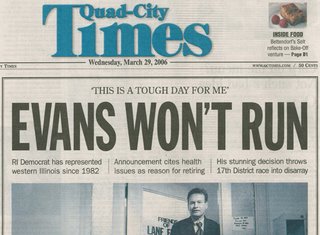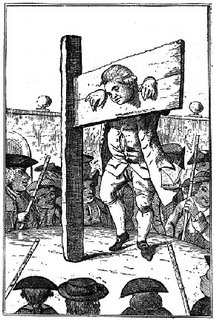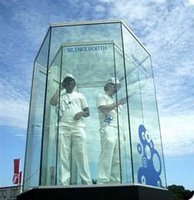Headline writer comes through again

Davenport, Iowa's Quad-City Times, never accused of either subtlety or wit, may have finally ignorantly topped itself.
The bombing of Libya in 1986 inspired the previous QC Times shameful headline champion. That raid — which killed 15 civilians, including a 15-month-old baby girl — moved the Times to festoon its front page with a single towering word from gutter to gutter: Gotcha!
Now that's the kind of boorish behavior that earns all of us flyover victims our rube stripes. Thanks for representin', Quad-City Times!
So what's the deal with today's headline? Why would a simple announcement of a candidate declining to run for office demand a reaction?
The candidate in question, Democrat Lane Evans, has represented western Illinois' 17th district for 20 years, and the fact that he Won't Run shouldn't be a big deal except that the dude has Parkinson's disease and is giving up his seat because his health has deteriorated dramatically. Evans not only won't Run, the poor guy probably will never walk again.
Yes, there is a good degree of black humor in the situation, and I can appreciate that, but (full blog disclosure) as a former employee of the venerable Times, I know firsthand the journalistic and intellectual integrity that is lacking by the armload in that newsroom. Ignorance is kind of a badge of courage at the Davenport rag, and once again, it's been fully earned.
Beyond the dopey headline, there is a real news story here. Evans has been one of those model Union democrats in this part of the country where many union retirees of farm implement plants have made his reelection campaigns coronations. Add to that his ability to meet individual needs of constituents and remain strong on military issues, and Evans has been a strong presence for the Democratic party in the House.
But now, for the first time in 20 years, that big seat is up for grabs and Illinois Dems (perhaps in microcosm to the situation that faces the party nationally) are caught with no real backup plan. Not a good situation for a party that is basically counting on making big seat gains this November.
So watch for Republican money to start flowing into western Illinois as their leaders target this district for takeover. Luckily for the Democrats the Red candidate is one with many personal negatives and no governing experience. As long as the old Union guys and Vietnam vets come out to pull the blue lever in Lane Evan's memory, the Democrats should still squeak out one more term on the legacy vote.




















